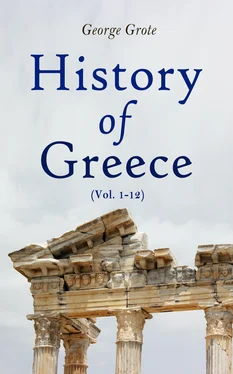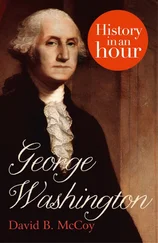George Grote - History of Greece (Vol. 1-12)
Здесь есть возможность читать онлайн «George Grote - History of Greece (Vol. 1-12)» — ознакомительный отрывок электронной книги совершенно бесплатно, а после прочтения отрывка купить полную версию. В некоторых случаях можно слушать аудио, скачать через торрент в формате fb2 и присутствует краткое содержание. Жанр: unrecognised, на английском языке. Описание произведения, (предисловие) а так же отзывы посетителей доступны на портале библиотеки ЛибКат.
- Название:History of Greece (Vol. 1-12)
- Автор:
- Жанр:
- Год:неизвестен
- ISBN:нет данных
- Рейтинг книги:5 / 5. Голосов: 1
-
Избранное:Добавить в избранное
- Отзывы:
-
Ваша оценка:
- 100
- 1
- 2
- 3
- 4
- 5
History of Greece (Vol. 1-12): краткое содержание, описание и аннотация
Предлагаем к чтению аннотацию, описание, краткое содержание или предисловие (зависит от того, что написал сам автор книги «History of Greece (Vol. 1-12)»). Если вы не нашли необходимую информацию о книге — напишите в комментариях, мы постараемся отыскать её.
History of Greece (Vol. 1-12) — читать онлайн ознакомительный отрывок
Ниже представлен текст книги, разбитый по страницам. Система сохранения места последней прочитанной страницы, позволяет с удобством читать онлайн бесплатно книгу «History of Greece (Vol. 1-12)», без необходимости каждый раз заново искать на чём Вы остановились. Поставьте закладку, и сможете в любой момент перейти на страницу, на которой закончили чтение.
Интервал:
Закладка:
Such are the legends of Dêlos and Delphi, according to the Homeric Hymn to Apollo. The specific functions of the god, and the chief localities of his worship, together with the surnames attached to them, are thus historically explained, being connected with his past acts and adventures. Though these are to us only interesting poetry, yet to those who heard them sung they possessed all the requisites of history, and were fully believed as such, not because they were partially founded in reality, but because they ran in complete harmony with the feelings; and, so long as that condition was fulfilled, it was not the fashion of the time to canvass truth or falsehood. The narrative is purely personal, without any discernible symbolized doctrine or allegory, to serve as a supposed ulterior purpose: the particular deeds ascribed to Apollo grow out of the general preconceptions as to his attributes, combined with the present realities of his worship. It is neither history nor allegory, but simple mythe or legend.
The worship of Apollo is among the most ancient, capital, and strongly marked facts of the Grecian world, and widely diffused over every branch of the race. It is older than the Iliad or Odyssey, in the latter of which both Pythô and Dêlos are noted, though Dêlos is not named in the former. But the ancient Apollo is different in more respects than one from the Apollo of later times. He is in an especial manner the god of the Trojans, unfriendly to the Greeks, and especially to Achilles; he has, moreover, only two primary attributes, his bow and his prophetic powers, without any distinct connection either with the harp, or with medicine, or with the sun, all which in later times he came to comprehend. He is not only, as Apollo Karneius, the chief god of the Doric race, but also (under the surname of Patrôus) the great protecting divinity of the gentile tie among the Ionians: 106he is moreover the guide and stimulus to Grecian colonization, scarcely any colony being ever sent out without encouragement and direction from the oracle at Delphi: Apollo Archêgetês is one of his great surnames. 107His temple lends sanctity to the meetings of the Amphiktyonic assembly, and he is always in filial subordination and harmony with his father Zeus: Delphi and Olympia are never found in conflict. In the Iliad, the warm and earnest patrons of the Greeks are Hêrê, Athênê, and Poseidôn: here too Zeus and Apollo are seen in harmony, for Zeus is decidedly well-inclined to the Trojans, and reluctantly sacrifices them to the importunity of the two great goddesses. 108The worship of the Sminthian Apollo, in various parts of the Troad and the neighboring territory, dates before the earliest periods of Æolic colonization: 109hence the zealous patronage of Troy ascribed to him in the Iliad. Altogether, however, the distribution and partialities of the gods in that poem are different from what they become in later times,—a difference which our means of information do not enable us satisfactorily to explain. Besides the Delphian temple, Apollo had numerous temples throughout Greece, and oracles at Abæ in Phôkis, on the Mount Ptôon, and at Tegyra in Bœotia, where he was said to have been born, 110at Branchidæ near Milêtus, at Klarus in Asia Minor, and at Patara in Lykia. He was not the only oracular god: Zeus at Dodona and at Olympia gave responses also: the gods or heroes Trophônius, Amphiaraus, Amphilochus, Mopsus, etc., each at his own sanctuary and in his own prescribed manner, rendered the same service.
The two legends of Delphi and Dêlos, above noticed, form of course a very insignificant fraction of the narratives which once existed respecting the great and venerated Apollo. They serve only as specimens, and as very early specimens, 111to illustrate what these divine mythes were, and what was the turn of Grecian faith and imagination. The constantly recurring festivals of the gods caused an incessant demand for new mythes respecting them, or at least for varieties and reproductions of the old mythes. Even during the third century of the Christian æra, in the time of the rhêtôr Menander, when the old forms of Paganism were waning and when the stock of mythes in existence was extremely abundant, we see this demand in great force; but it was incomparably more operative in those earlier times when the creative vein of the Grecian mind yet retained its pristine and unfaded richness. Each god had many different surnames, temples, groves, and solemnities; with each of which was connected more or less of mythical narrative, originally hatched in the prolific and spontaneous fancy of a believing neighborhood, to be afterwards expanded, adorned and diffused by the song of the poet. The earliest subject of competition 112at the great Pythian festival was the singing of a hymn in honor of Apollo: other agones were subsequently added, but the ode or hymn constituted the fundamental attribute of the solemnity: the Pythia at Sikyôn and elsewhere were probably framed on a similar footing. So too at the ancient and celebrated Charitêsia, or festival of the Charites, at Orchomenos, the rivalry of the poets in their various modes of composition both began and continued as the predominant feature: 113and the inestimable treasures yet remaining to us of Attic tragedy and comedy, are gleanings from the once numerous dramas exhibited at the solemnity of the Dionysia. The Ephesians gave considerable rewards for the best hymns in honor of Artemis, to be sung at her temple. 114And the early lyric poets of Greece, though their works have not descended to us, devoted their genius largely to similar productions, as may be seen by the titles and fragments yet remaining.
Both the Christian and the Mahomedan religions have begun during the historical age, have been propagated from one common centre, and have been erected upon the ruins of a different pre-existing faith. With none of these particulars did Grecian Paganism correspond. It took rise in an age of imagination and feeling simply, without the restraints, as well as without the aid, of writing or records, of history or philosophy: it was, as a general rule, the spontaneous product of many separate tribes and localities, imitation and propagation operating as subordinate causes; it was moreover a primordial faith, as far as our means of information enable us to discover. These considerations explain to us two facts in the history of the early Pagan mind: first, the divine mythes, the matter of their religion, constituted also the matter of their earliest history; next, these mythes harmonized with each other only in their general types, but differed incurably in respect of particular incidents. The poet who sung a new adventure of Apollo, the trace of which he might have heard in some remote locality, would take care that it should be agreeable to the general conceptions which his hearers entertained respecting the god. He would not ascribe the cestus or amorous influences to Athênê, nor armed interference and the ægis to Aphroditê; but, provided he maintained this general keeping, he might indulge his fancy without restraint in the particular events of the story. 115The feelings and faith of his hearers went along with him, and there were no critical scruples to hold them back: to scrutinize the alleged proceedings of the gods was repulsive, and to disbelieve them impious. And thus these divine mythes, though they had their root simply in religious feelings, and though they presented great discrepancies of fact, served nevertheless as primitive matter of history to an early Greek: they were the only narratives, at once publicly accredited and interesting, which he possessed. To them were aggregated the heroic mythes (to which we shall proceed presently),—indeed the two are inseparably blended, gods, heroes and men almost always appearing in the same picture,—analogous both in their structure and their genesis, and differing chiefly in the circumstance that they sprang from the type of a hero instead of from that of a god.
Читать дальшеИнтервал:
Закладка:
Похожие книги на «History of Greece (Vol. 1-12)»
Представляем Вашему вниманию похожие книги на «History of Greece (Vol. 1-12)» списком для выбора. Мы отобрали схожую по названию и смыслу литературу в надежде предоставить читателям больше вариантов отыскать новые, интересные, ещё непрочитанные произведения.
Обсуждение, отзывы о книге «History of Greece (Vol. 1-12)» и просто собственные мнения читателей. Оставьте ваши комментарии, напишите, что Вы думаете о произведении, его смысле или главных героях. Укажите что конкретно понравилось, а что нет, и почему Вы так считаете.












